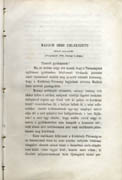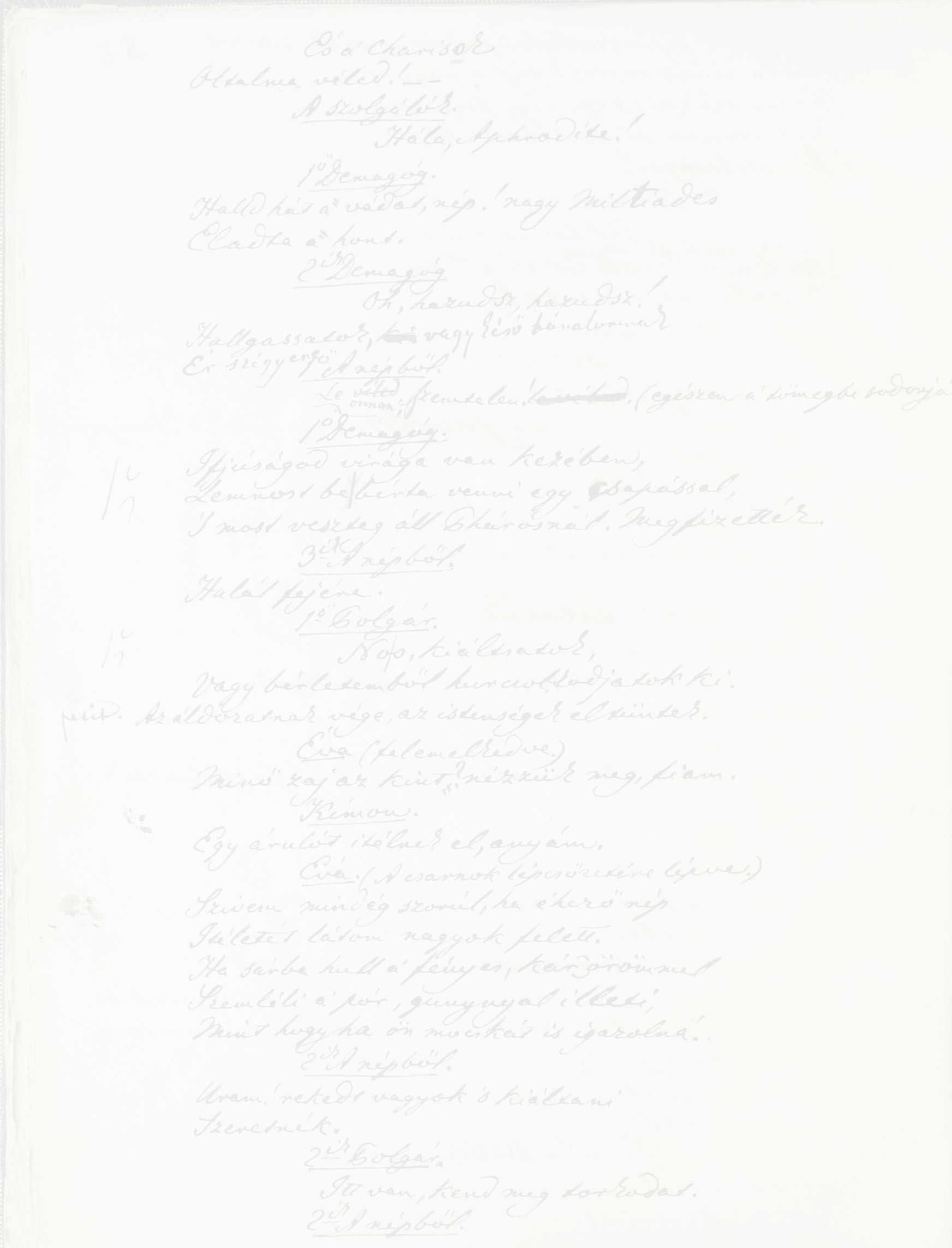


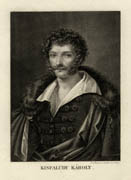 The Kisfaludy Society was founded in honor of Károly Kisfaludy by his friends.
Initially, it only aimed to keeping alive the memory of the great writer, but in
1836 they defined their tasks more broadly: the development of Hungarian
literature, and the encouragement of young writers through competitions. The
Kisfaludy Society began its operation in 1837, its first statutes were printed
in 1838.
The Kisfaludy Society was founded in honor of Károly Kisfaludy by his friends.
Initially, it only aimed to keeping alive the memory of the great writer, but in
1836 they defined their tasks more broadly: the development of Hungarian
literature, and the encouragement of young writers through competitions. The
Kisfaludy Society began its operation in 1837, its first statutes were printed
in 1838.
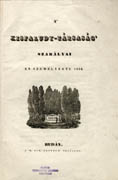 The
society had monthly meetings, and once a year, on the birthday of Károly
Kisfaludy, 8 February, it had a solemn general assembly. The writers could
become members of the society by elections, but the statutes also knew the
status of supporting member. By paying the annual membership fee, the supporting
members were entitled to receive complimentary copies of the society’s
publications. The Kisfaludy Society closely collaborated with the Hungarian
Academy of Sciences, it held its meeting in the rented halls of the Academy, and
from 1866 in the palace of the HAS. The membership of the two institutions also
overlapped to a certain extent: one can say that becoming a member of the
Kisfaludy Society almost always anticipated the academic membership. The
Kisfaludy Society worked from 1837 until 1952. After its dissolution, its
collection of relics and archive, as well as the – fragmentary – official
documents were handed over to the Library of the Hungarian Academy of Sciences.
The
society had monthly meetings, and once a year, on the birthday of Károly
Kisfaludy, 8 February, it had a solemn general assembly. The writers could
become members of the society by elections, but the statutes also knew the
status of supporting member. By paying the annual membership fee, the supporting
members were entitled to receive complimentary copies of the society’s
publications. The Kisfaludy Society closely collaborated with the Hungarian
Academy of Sciences, it held its meeting in the rented halls of the Academy, and
from 1866 in the palace of the HAS. The membership of the two institutions also
overlapped to a certain extent: one can say that becoming a member of the
Kisfaludy Society almost always anticipated the academic membership. The
Kisfaludy Society worked from 1837 until 1952. After its dissolution, its
collection of relics and archive, as well as the – fragmentary – official
documents were handed over to the Library of the Hungarian Academy of Sciences.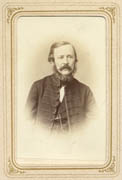 After the defeat of the 1848/49 War of Independence, similarly to other national
institutions, the public working of the Kisfaludy Society was also banned. Over
time, the failures in foreign policy and economy pushed the Hapsburg Empire to
loosen their repressive policy in Hungary. In 1860 the Kisfaludy Society could
start its operation again, but it was under the control of the government, and
their meetings had to be reported to the governor’s council. The following years
can be considered as the golden age of the society. Its president, József Eötvös
was a renowned author and thinker of his age,
After the defeat of the 1848/49 War of Independence, similarly to other national
institutions, the public working of the Kisfaludy Society was also banned. Over
time, the failures in foreign policy and economy pushed the Hapsburg Empire to
loosen their repressive policy in Hungary. In 1860 the Kisfaludy Society could
start its operation again, but it was under the control of the government, and
their meetings had to be reported to the governor’s council. The following years
can be considered as the golden age of the society. Its president, József Eötvös
was a renowned author and thinker of his age,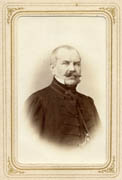 in
1848 Minister of Religion and Education, its vice-president Ferenc Toldy, the
father of Hungarian literary historiography, who soon became a university
professor; and the society’s director – until his election as the general
secretary of the Academy – János Arany, the greatest poet as well as the
greatest literary authority of his time.
in
1848 Minister of Religion and Education, its vice-president Ferenc Toldy, the
father of Hungarian literary historiography, who soon became a university
professor; and the society’s director – until his election as the general
secretary of the Academy – János Arany, the greatest poet as well as the
greatest literary authority of his time.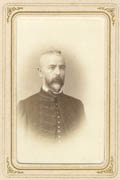 We have won, my friend!”, expressed the atmosphere of the meeting János
Arany.
3
The historian Iván
Nagy, a close friend of Madách first heard from Ferenc Toldy about the events of
the meeting, and in his letter written in early November 1861 he hastened to
share it with Madách as well: Toldy enthusiastically commented on the Tragedy,
saying that it must be translated into German and other languages, because it
would become world famous.
4
We have won, my friend!”, expressed the atmosphere of the meeting János
Arany.
3
The historian Iván
Nagy, a close friend of Madách first heard from Ferenc Toldy about the events of
the meeting, and in his letter written in early November 1861 he hastened to
share it with Madách as well: Toldy enthusiastically commented on the Tragedy,
saying that it must be translated into German and other languages, because it
would become world famous.
4
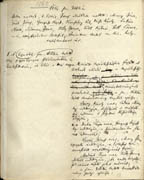 The annual meeting of election of members was held on 30 January
1862 with the participation of government councilor Antal Baintner as the
inspector of the government. Imre Madách was recommended by Ferenc Toldy for his
excellent work The tragedy of man. He was elected with nine votes from
ten an ordinary member of the Kisfaludy Society.
8
The annual meeting of election of members was held on 30 January
1862 with the participation of government councilor Antal Baintner as the
inspector of the government. Imre Madách was recommended by Ferenc Toldy for his
excellent work The tragedy of man. He was elected with nine votes from
ten an ordinary member of the Kisfaludy Society.
8
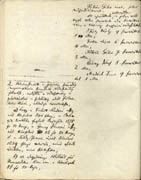 According to the statutes, a newly elected member is presented to the society by
an old member, and then the new member occupies his place with a freely elected
lecture. Madách in his above quoted letter of 20 February 1862 asked János
Arany to tell the introductory words before his inaugural lecture, since Arany
made his name known in literary circles, and his refusal could have also buried
him forever. Arany willingly undertook this task. According to paragraph 1 of
the meeting of 27 March 1862, director János Arany greets and introduces Imre
Madách, newly elected ordinary member, who occupies his seat with the lecture
The mutual influence of aesthetics and society.
9
According to the statutes, a newly elected member is presented to the society by
an old member, and then the new member occupies his place with a freely elected
lecture. Madách in his above quoted letter of 20 February 1862 asked János
Arany to tell the introductory words before his inaugural lecture, since Arany
made his name known in literary circles, and his refusal could have also buried
him forever. Arany willingly undertook this task. According to paragraph 1 of
the meeting of 27 March 1862, director János Arany greets and introduces Imre
Madách, newly elected ordinary member, who occupies his seat with the lecture
The mutual influence of aesthetics and society.
9
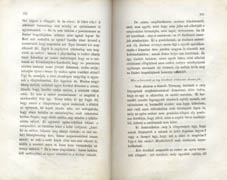
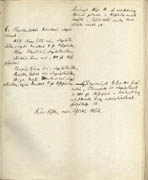 from the honorary of the first edition of the Tragedy. At this meeting, a
total of 110 forints and five founding letters were acknowledged.
from the honorary of the first edition of the Tragedy. At this meeting, a
total of 110 forints and five founding letters were acknowledged.